Comprehensive Guide to Garden Maintenance in Summer Hill
Introduction to Garden Maintenance in Summer Hill
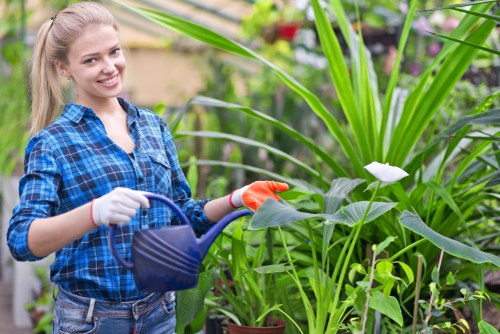
Summer Hill, a picturesque suburb known for its vibrant community and lush greenery, offers a perfect environment for gardening enthusiasts. Maintaining a garden here requires a blend of proper planning, regular care, and an understanding of the local climate. Whether you're a seasoned gardener or a beginner, effective garden maintenance in Summer Hill ensures your outdoor space remains beautiful and thriving throughout the year.
In this guide, we'll explore essential tips and strategies for garden maintenance in Summer Hill, covering everything from soil preparation to pest control. By following these recommendations, you can achieve a flourishing garden that enhances the beauty of your home and provides a serene retreat for relaxation.
Proper garden maintenance not only boosts the aesthetic appeal of your property but also contributes to a healthier environment. Well-maintained gardens improve air quality, provide habitats for local wildlife, and offer a source of fresh produce if you choose to grow vegetables or herbs. Let's delve into the key aspects of maintaining a garden in Summer Hill.
Seasonal Garden Care
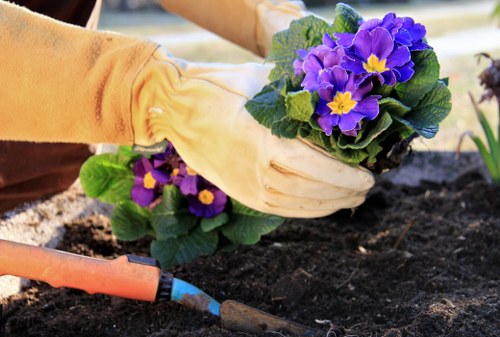
Spring Maintenance
Spring is a critical time for garden maintenance in Summer Hill. As the weather warms up, it's essential to prepare your garden for the growing season. Begin by clearing out any debris from the winter months, such as fallen leaves and dead plants. This cleanup helps prevent pests and diseases from taking hold.
Next, focus on soil preparation. Testing your soil's pH and nutrient levels ensures it's ready for planting. Adding compost or organic matter can improve soil structure, drainage, and fertility, providing a healthy foundation for your plants.
Finally, plan your planting schedule. Early spring is ideal for sowing seeds and transplanting young plants. Choose native species and drought-resistant varieties that thrive in Summer Hill's climate, reducing the need for excessive watering and maintenance.
Summer Maintenance
Summer Hill experiences warm summers, making summer maintenance crucial for preventing plant stress and ensuring healthy growth. Regular watering is essential, especially during dry spells. Implementing an efficient irrigation system, such as drip irrigation or soaker hoses, can help conserve water and deliver it directly to plant roots.
Mulching is another important practice during summer months. Applying a layer of mulch around plants helps retain soil moisture, regulate temperature, and suppress weed growth. Organic mulches like straw, bark, or compost are excellent choices for Summer Hill gardens.
Additionally, keep an eye out for pests and diseases. Regularly inspecting your plants for signs of infestation or infection allows you to take timely action. Natural pest control methods, such as introducing beneficial insects or using organic sprays, can help maintain a healthy garden without harmful chemicals.
Soil and Fertilization
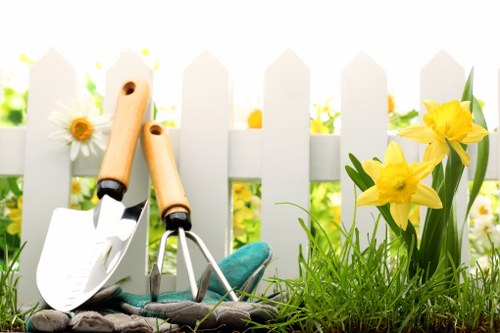
Understanding Soil Types
The success of your garden largely depends on the quality of the soil. Summer Hill's soil can vary, so it's essential to understand its characteristics. Conduct a soil test to determine its texture, composition, and nutrient levels. This information will guide your soil amendment and fertilization strategies.
Clay soils are common in some areas, offering good nutrient retention but poor drainage. To improve clay soil, incorporate organic matter like compost or aged manure, which enhances aeration and drainage. Sandy soils, on the other hand, drain quickly but may lack essential nutrients. Adding organic matter can also benefit sandy soils by increasing water retention and fertility.
Loamy soil, a balanced mix of sand, silt, and clay, is ideal for most plants. If your garden has loamy soil, you'll likely need fewer amendments, but regular additions of compost can maintain its fertility and structure over time.
Fertilization Tips
Fertilizing your garden in Summer Hill ensures your plants receive the necessary nutrients for optimal growth. Choose fertilizers based on your soil test results and the specific needs of your plants. Organic fertilizers, such as bone meal, blood meal, or fish emulsion, provide slow-release nutrients and improve soil health.
A balanced fertilizer with equal proportions of nitrogen, phosphorus, and potassium (N-P-K) is suitable for most gardens. However, certain plants may require specialized fertilizers. For example, flowering plants benefit from higher phosphorus levels, while leafy greens thrive with more nitrogen.
Apply fertilizers according to the manufacturer's instructions to avoid over-fertilization, which can harm plants and contaminate waterways. Regular feeding, typically every four to six weeks during the growing season, promotes sustained plant health and productivity.
Pruning and Trimming
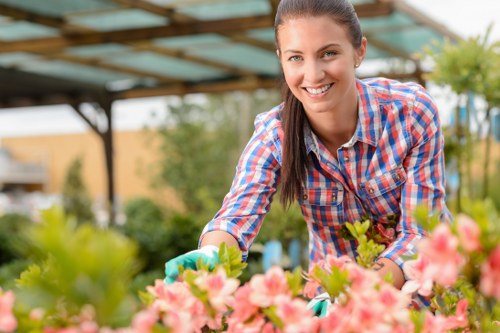
Why Pruning is Important
Pruning and trimming are essential practices for maintaining the health and appearance of your garden. Regular pruning helps remove dead or diseased branches, promoting better air circulation and reducing the risk of pest infestations. It also encourages new growth and enhances the overall structure of plants.
For flowering shrubs and trees, pruning ensures more abundant and vibrant blooms. By removing old flowers, you stimulate the plant to produce new ones, extending the blooming season. Additionally, well-pruned plants are less likely to become overgrown, making your garden look tidy and well-maintained.
Proper pruning techniques vary depending on the type of plant. It's important to research the specific needs of each species in your garden to ensure effective and safe trimming practices. Using clean, sharp tools minimizes damage to plants and promotes quicker recovery after pruning.
Trimming Techniques
When trimming hedges and shrubs, aim for a balanced shape that allows light to penetrate and air to circulate. Start by removing any dead or crossing branches, then shape the plant by cutting back to a healthy bud or branch. Avoid cutting too much at once, as this can stress the plant.
For trees, focus on removing any dead, diseased, or damaged branches first. Then, thin out the canopy to improve air flow and reduce the risk of limb breakage during storms, which are common in Summer Hill. Pinching back new growth can also help control the size and shape of the tree.
Pruning flowering plants should be timed according to their blooming cycle. Some plants, like roses, benefit from early spring pruning, while others may require post-blooming trimming to encourage new growth.
Weed Control
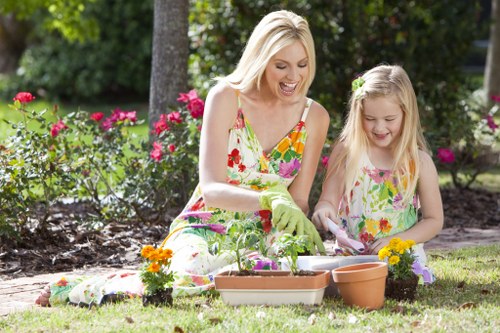
Importance of Weed Management
Weeds can quickly overtake your garden, competing with your plants for nutrients, water, and light. Effective weed control is crucial for maintaining a healthy and attractive garden in Summer Hill. Preventing weed growth from the start is the most efficient strategy.
Mulching is a natural and effective method for suppressing weeds. By covering the soil with a layer of organic or inorganic mulch, you reduce the sunlight reaching weed seeds, inhibiting their growth. Additionally, mulch helps maintain soil moisture and temperature, benefiting your plants.
Regularly inspecting your garden and removing weeds by hand can also control their spread. For larger areas or persistent weeds, consider using landscape fabric or installing garden edging to create barriers that prevent weed intrusion.
Organic Weed Control Methods
Opting for organic weed control methods aligns with sustainable gardening practices and protects the local ecosystem in Summer Hill. Vinegar-based herbicides, for example, provide a non-toxic way to eliminate weeds without harming desirable plants when applied carefully.
Boiling water is another natural weed killer that can be used for spot treatment. It's particularly effective for weeds growing in cracks or hard-to-reach areas. However, exercise caution to avoid damaging nearby plants.
Encouraging a dense garden canopy by planting ground covers or densely spaced plants also naturally suppresses weed growth. This method reduces the available space and resources for weeds to establish, maintaining a clean and controlled garden environment.
Pest and Disease Management
Identifying Common Pests
Summer Hill's warm climate can attract a variety of garden pests that threaten plant health. Common pests include aphids, caterpillars, slugs, and beetles. Identifying these pests early allows for timely intervention, preventing significant damage to your garden.
Aphids are small, sap-sucking insects that can stunt plant growth and transmit diseases. Caterpillars and slugs feed on leaves and stems, causing extensive defoliation. Beetles, such as Japanese beetles, can also cause significant harm by feeding on flowers and foliage.
Regularly inspecting your plants for signs of pests, such as holes in leaves, sticky residues, or visible insects, helps in early detection. Early identification is key to effective pest management, minimizing the need for more drastic control measures.
Organic and Chemical Control Options
Implementing integrated pest management (IPM) strategies ensures a balanced approach to controlling garden pests. Start with preventive measures, such as maintaining plant health and encouraging beneficial insects like ladybugs and predatory beetles that naturally control pest populations.
If pest populations become problematic, consider organic control options. Neem oil, insecticidal soaps, and diatomaceous earth are effective and environmentally friendly solutions. These treatments target pests without harming beneficial insects or contaminating the soil.
For severe infestations, chemical pesticides may be necessary. However, use them sparingly and follow the manufacturer's instructions to minimize environmental impact. Always opt for the least toxic option available and prioritize non-chemical methods whenever possible.
Watering and Irrigation
Efficient Watering Practices
Effective watering is a cornerstone of successful garden maintenance in Summer Hill. Proper irrigation ensures that your plants receive the right amount of water, promoting healthy growth and preventing issues like root rot or drought stress.
Watering early in the morning or late in the evening reduces water loss due to evaporation and allows plants to absorb moisture more efficiently. This timing also helps prevent fungal diseases that thrive in wet conditions.
Using a soaker hose or drip irrigation system delivers water directly to the plant roots, minimizing waste and ensuring deep penetration. These methods are more efficient than overhead sprinklers, which can lead to water runoff and uneven distribution.
Water Conservation Tips
Conserving water not only benefits the environment but also reduces your garden maintenance costs. Implementing water-wise practices is essential, especially during the warmer months in Summer Hill.
Mulching, as mentioned earlier, helps retain soil moisture, reducing the need for frequent watering. Additionally, grouping plants with similar water requirements together allows for more targeted and efficient irrigation.
Collecting rainwater in barrels provides an eco-friendly source of water for your garden. Rainwater is free from the chemicals found in tap water, making it ideal for plants. Regularly monitoring soil moisture levels ensures you're watering only when necessary, preventing overwatering and promoting sustainable garden practices.
Choosing the Right Plants
Native and Drought-Resistant Plants
Selecting the appropriate plants for your Summer Hill garden is crucial for easy maintenance and sustainability. Native plants are well-adapted to the local climate and soil conditions, making them more resilient and requiring less care.
Drought-resistant plants are particularly beneficial in areas with limited water availability or during dry spells. These plants have deep root systems that efficiently capture and store water, allowing them to thrive with minimal irrigation.
Examples of native and drought-resistant plants suitable for Summer Hill include Lavender, Kangaroo Paw, Grevillea, and Eucalyptus. Incorporating a mix of these species into your garden ensures a diverse and robust ecosystem that supports both plant health and local wildlife.
Annuals vs. Perennials
Deciding between annuals and perennials depends on your gardening goals and maintenance preferences. Annuals complete their life cycle within a year, providing vibrant blooms and adding seasonal color to your garden. However, they require replanting each year, which can be labor-intensive.
Perennials, on the other hand, return year after year, offering long-term stability and reducing the need for constant planting. They often require less maintenance once established and can provide a consistent structure to your garden design.
In Summer Hill gardens, a combination of annuals and perennials can create a dynamic and ever-changing landscape. Annuals add immediate color and variety, while perennials provide a reliable foundation that supports the overall garden ecosystem.
Mulching and Composting
Benefits of Mulching
Mulching is a versatile gardening practice that offers multiple benefits for maintaining a healthy garden in Summer Hill. By covering the soil with organic or inorganic materials, mulch helps conserve moisture, regulate soil temperature, and suppress weed growth.
Organic mulches, such as bark chips, straw, or shredded leaves, break down over time, enriching the soil with nutrients and improving its structure. Inorganic mulches, like gravel or landscape fabric, provide lasting coverage without adding nutrients, making them ideal for pathways or decorative areas.
Applying mulch around plants also protects the soil from erosion caused by heavy rains and wind. This safeguard is particularly important in regions like Summer Hill, where weather conditions can vary.
Composting Practices
Composting transforms kitchen scraps, garden waste, and other organic materials into rich, fertile compost that enhances soil health. Incorporating compost into your garden improves soil structure, increases nutrient availability, and promotes beneficial microbial activity.
To create a successful compost pile, combine green materials (like vegetable scraps and fresh grass clippings) with brown materials (such as dry leaves, straw, and paper). Maintaining the right balance of moisture and aeration accelerates the decomposition process, resulting in nutrient-dense compost within a few months.
Using homemade compost reduces the need for chemical fertilizers, fostering a more sustainable and eco-friendly garden. Additionally, compost helps retain soil moisture, reducing watering needs and supporting resilient plant growth in Summer Hill's climate.
Garden Tools and Equipment
Essential Tools for Garden Maintenance
Having the right tools and equipment is essential for efficient garden maintenance in Summer Hill. Investing in quality tools not only makes gardening tasks easier but also ensures better results and longer tool lifespan.
Basic garden tools include a sturdy pair of gloves, a reliable shovel, a hand trowel, pruning shears, a garden fork, and a watering can or hose. These tools cover the fundamental tasks of planting, digging, pruning, and watering, forming the foundation of your gardening toolkit.
For more advanced maintenance, consider tools like a lawnmower for keeping your grass tidy, a hoe for weeding, and a rake for clearing debris and leveling soil. Additionally, investing in ergonomic tools can reduce strain and fatigue, making gardening more enjoyable and sustainable.
Equipment Maintenance Tips
Proper maintenance of your garden tools extends their lifespan and ensures they remain effective. After each use, clean tools thoroughly to remove dirt, sap, and plant residues that can cause corrosion or damage. Dry them completely to prevent rusting, especially in humid climates like Summer Hill.
Regularly sharpening blades for cutting tools like pruners and shears enhances their performance and reduces the effort required for pruning or cutting. Lubricating moving parts with oil prevents rust and keeps tools functioning smoothly.
Storing tools in a dry, sheltered area protects them from the elements and physical damage. Organizing your tools systematically also makes them easily accessible, encouraging regular use and proper maintenance practices.
Local Relevance: Servicing Surrounding Areas
Nearby Areas to Summer Hill
For residents of Summer Hill seeking garden maintenance services, there are several neighboring areas that also benefit from expert gardening care. Understanding the unique features and proximity of these areas can help you choose the right service provider.
- Stanmore: Located just south of Summer Hill, Stanmore offers a blend of residential and commercial spaces, ideal for diverse garden maintenance needs.
- Glennan: To the west, Glennan is known for its spacious homes and expansive gardens, requiring specialized care and attention.
- Burwood: East of Summer Hill, Burwood is a bustling suburb with a mix of older homes and modern properties, each with unique gardening requirements.
- Leichhardt: Northwest of Summer Hill, Leichhardt is famed for its vibrant community gardens and green spaces, perfect for collaborative gardening projects.
- Newtown: Northeast, Newtown offers eclectic gardens that often feature innovative and sustainable gardening practices.
- Inner West: Adjacent to Summer Hill, Inner West encompasses several suburbs, each with distinct gardening styles and preferences.
- Kingsford: Southeast lies Kingsford, an area with both residential and recreational gardens, benefiting from professional maintenance services.
- Petersham: South of Summer Hill, Petersham is characterized by elegant gardens and heritage properties that require meticulous care.
- Lewisham: Further south, Lewisham features extensive green spaces and parks, ideal for larger-scale garden maintenance projects.
- Enmore: East, Enmore combines urban living with lush gardens, necessitating a balance of aesthetic and functional maintenance.
- Marrickville: Southwest, Marrickville is known for its community gardens and diverse plant selections, requiring adaptable maintenance approaches.
- Forest Lodge: Northwest, Forest Lodge offers serene gardens and private green spaces, perfect for personalized garden care services.
- Ashfield: Northeast, Ashfield encompasses a variety of residential gardens, each with unique landscaping needs.
- Summer Bay: Adjacent to Summer Hill, Summer Bay is renowned for its beautiful coastal gardens, attracting gardeners who appreciate seaside flora.
- Lewisham East: Further east, Lewisham East merges urban and natural elements, supporting a variety of gardening styles and practices.
By catering to these neighboring areas, garden maintenance services in Summer Hill can extend their expertise and enhance the green landscapes of a broader community.
Unique Gardening Needs of Nearby Areas
Each nearby area has its distinct gardening requirements influenced by local architecture, climate microzones, and community preferences. Understanding these nuances allows garden maintenance professionals to tailor their services effectively.
For instance, heritage properties in Petersham may require delicate care to preserve original garden structures and plant species. In contrast, community gardens in Leichhardt and Marrickville thrive on sustainable practices and collective gardening efforts.
Urban gardens in Newtown and Enmore may prioritize space-efficient planting and innovative designs, while the expansive gardens in Glennan and Lewisham demand extensive maintenance routines and specialized landscaping techniques.
Tips for Sustainable Garden Maintenance
Eco-Friendly Practices
Sustainable garden maintenance in Summer Hill not only benefits your garden but also contributes to environmental preservation. Implementing eco-friendly practices reduces your garden's carbon footprint and promotes biodiversity.
Using organic fertilizers and compost enhances soil health without introducing harmful chemicals into the ecosystem. Choosing native and drought-resistant plants supports local wildlife and reduces the need for excessive watering and maintenance.
Incorporating rainwater harvesting systems and efficient irrigation methods conserves water, a valuable resource in maintaining a sustainable garden. Additionally, minimizing the use of pesticides and opting for natural pest control techniques protects beneficial insects and surrounding habitats.
Composting and Recycling
Composting not only enriches your soil but also reduces household waste by recycling organic materials. Setting up a compost bin in your garden allows you to transform kitchen scraps, garden trimmings, and other biodegradable waste into valuable compost.
Recycling garden waste conserves landfill space and decreases the environmental impact associated with waste disposal. By reusing materials like wood chips, shredded leaves, and biodegradable containers, you promote a circular economy within your gardening practices.
Educating yourself and your community about the benefits of composting and recycling encourages more sustainable behaviors, fostering a greener and more resilient environment in Summer Hill.
Conclusion
Maintaining a beautiful and healthy garden in Summer Hill is an achievable goal with the right knowledge and practices. From seasonal care and proper fertilization to pest management and sustainable practices, each aspect plays a vital role in the overall health of your garden.
By understanding the unique climate and soil conditions of Summer Hill, choosing the right plants, and implementing efficient maintenance strategies, you can create a thriving outdoor space that enhances your home's beauty and provides a peaceful sanctuary.
Ready to transform your garden? Contact us today to book your garden maintenance service and experience the difference professional care can make.
Embrace the joys of gardening in Summer Hill and enjoy a lush, vibrant garden all year round!
